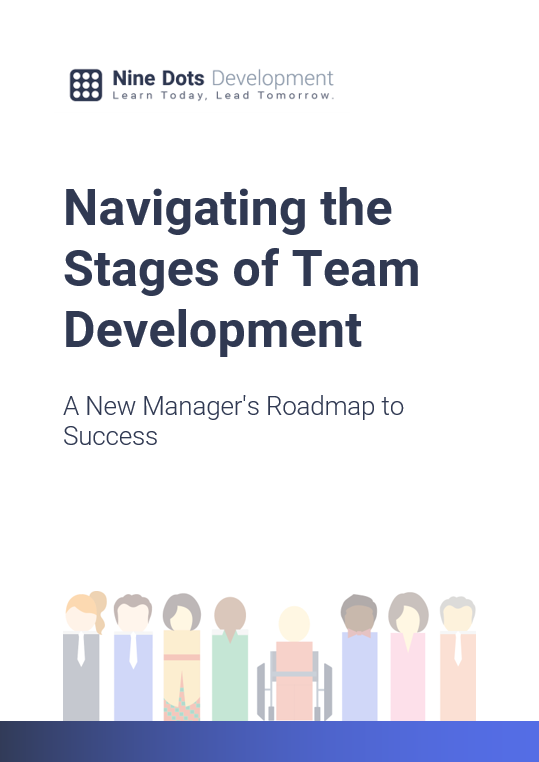Sunday 04 Jun 2023 Article
The TakeawayBuilding Effective Teams: Fostering Collaboration and High Performance
How to Overcome the Trials and Tribulations of First-time Management
Part 11
#StaffMotivation #PerformanceOfTheTeam #ManagingPerformance #ExtrinsicMotivation #IntrinsicMotivation #DevelopingATeam #TeamDevelopment
The perfectly matched resource for this article...
A New Manager's Roadmap to Navigating the Stages of Team Development
As a new manager, understanding and effectively guiding your team through the stages of team development is crucial for building a high-performing and cohesive team. This downloadable handout provides an in-depth guide on the stages of team development and offers practical tips to support your team's growth and success at each stage.
Download!Playing catchup?
Building Effective Teams: Fostering Collaboration and High Performance
Building effective teams is essential for organisations to achieve their goals and maximise productivity. High-performing teams possess specific characteristics, progress through distinct stages of development, require strong motivation skills, and benefit from identifying and managing performance gaps. In this article, we will explore these key elements of team building, providing insights on how to cultivate collaborative and high-performing teams.
What Makes a High Performing Team
High-performing teams exhibit certain qualities that set them apart from average or dysfunctional teams. They demonstrate clear goals and shared objectives, effective communication and collaboration, trust and respect among team members, diversity and complementary skill sets, adaptability, and a commitment to continuous improvement. High-performing teams harness the collective intelligence and strengths of their members, fostering an environment that encourages innovation, creativity, and optimal performance.

Stages of Team Development
Teams evolve through distinct stages of development, as outlined by psychologist Bruce Tuckman's model: forming, storming, norming, performing, and adjourning.
- During the forming stage, team members get acquainted and define their roles and responsibilities.
- In the storming stage, conflicts and power struggles may arise as individuals assert themselves.
- In the norming stage, team members establish shared values, norms, and protocols, leading to improved cohesion.
- In the performing stage, the team operates at its highest level of productivity.
- Finally, the adjourning stage occurs when the team disbands or transitions to a new phase.
Understanding these stages helps leaders guide their teams through challenges and maximise their potential.
Motivation Skills
Motivation plays a crucial role in building effective teams. Leaders must understand what drives and inspires each team member to perform at their best. Motivation can be intrinsic, arising from personal fulfillment and a sense of purpose, or extrinsic, stemming from external rewards or recognition. Effective leaders tap into both forms of motivation by providing meaningful work, setting challenging but achievable goals, offering constructive feedback and recognition, fostering a positive and supportive environment, and promoting opportunities for growth and development. By understanding and addressing individual motivations, leaders can unlock the team's full potential.

Identifying and Managing Performance Gaps
Identifying and managing performance gaps is vital for the growth and success of a team. Performance gaps occur when there is a discrepancy between desired performance and actual performance. To address these gaps, leaders must first establish clear performance expectations and metrics. Regular monitoring and assessment enable the early detection of gaps. Once identified, leaders can provide targeted feedback, coaching, and training to bridge the gaps. They may also consider redistributing tasks, leveraging the strengths of team members, or implementing performance improvement plans. By actively managing performance gaps, leaders ensure that the team is continuously improving and reaching its full potential.
Creating a Supportive Environment
Creating a supportive environment is key to building effective teams. Leaders must foster a culture of trust, open communication, and psychological safety. Team members should feel comfortable sharing ideas, concerns, and feedback without fear of judgment or retribution. Encouraging collaboration, respecting diverse perspectives, and promoting a sense of belonging within the team contribute to a positive and supportive environment. Leaders can facilitate team-building activities, establish regular check-ins, and provide resources and support to enhance team cohesion and productivity.

Conclusion
Effective leaders recognise the importance of creating a supportive environment where team members feel empowered, engaged, and motivated. By harnessing the strengths of each team member, fostering collaboration, and addressing performance gaps, leaders can guide their teams towards success. Investing time and effort into building effective teams not only enhances productivity but also creates a culture of collaboration, innovation, and continuous improvement.
A New Manager's Roadmap to Navigating the Stages of Team Development
As a new manager, understanding and effectively guiding your team through the stages of team development is crucial for building a high-performing and cohesive team. This downloadable handout provides an in-depth guide on the stages of team development and offers practical tips to support your team's growth and success at each stage.
Download!Missed an article?
More from How to Overcome the Trials and Tribulations of First-time Management
